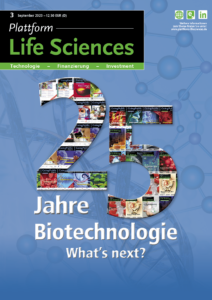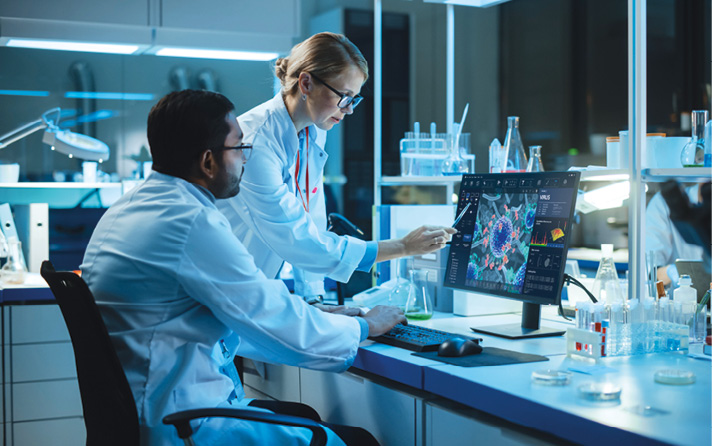Bildnachweis: @Mongkolchon – stock.adobe.com.
Tools and methods derived from artificial intelligence (AI) will revolutionize drug discovery processes by identifying novel molecular targets, increasing the probability of success in selecting promising lead structures and reducing the timeline and associated costs. How are AI-supported drug discovery methods adopted and how can the pharma/biotech industry and investors capitalize on this fundamental change? A recent study provides answers.
Recent progress in AI, with major advances in machine learning, neural networks, deep learning and other areas, is anticipated to fundamentally change the landscape of drug discovery. Focusing on the five-year period from 2018 to 2022, a recent comprehensive report commissioned by The Wellcome Trust and authored by the Boston Consulting Group (BCG report)[1] describes how the value of AI in drug discovery can be unlocked. In this article, we summarize key findings from this year’s BCG report to spur interest in this revolutionizing area of pharma research[2].
AI use cases in the drug discovery process
The BCG report identifies five “AI use cases” offering value in the early phases of the drug discovery process (Fig 1, A.). Taking the number of scientific publications as a measure of the relative impact of AI applications across these five AI use cases illustrates a clear bias in favour of AI applications to understand diseases and to facilitate small molecule drug discovery (AI use cases one and two). Approximately 80% of all publications describing AI applications in drug discovery from 2018 to 2022 fall into these two categories, with annual growth rates of 54% and 25%, respectively. Although the absolute number of publications for AI use in vaccine and antibody discovery and safety and toxicity applications (AI use cases three to five) is still small, annual growth rates of the number of publications are impressive (vaccines: 46%; antibodies: 51%; safety and toxicity: 23%), indicating AI’s expected future impact in these areas.
Analysing the use of AI across different therapeutic areas reveals a bias towards commercially attractive, well-validated or data-rich therapeutic areas, especially oncology (37%), COVID-19 (23%) and infectious disease (12%).

Adoption and investments in AI-supported drug discovery
The BCG report lists 228 ‘AI-first’ companies; i.e. biotech companies which have built their value proposition primarily around AI tools and methods. These are the biotechs leading and driving the adoption of AI methodology across all AI drug discovery use cases. They are in clear contrast to most biotech/pharma companies for which only about one third report the importance of AI support in their drug discovery processes as “substantial” or “excessive” (survey data from of 137 biotech/pharma companies).
For AI-first companies, the overall investment into AI-driven drug discovery projects amounted to USD 18 billion over the past ten years. About 60% of this total investment amount concentrated within the top-20 funded AI-first biotechs (Fig. 1, B.). Interestingly, within this top group, 80% focus on the first two AI use cases of understanding disease and small molecule design and optimization, with limited signs of expansion into vaccines or antibodies so far. Current business models applied by AI-first companies range from (i) providing AI platform solutions as fee-for-service, (ii) a mix of fee-for-service and in-house pipeline models and (iii) applying AI solutions to create in-house drug candidate pipelines.
Early value proof
The BCG report also analyses the value drivers for AI-supported drug discovery across the following parameters: (i) time and cost savings, (ii) increased probability of success and (iii) novelty of the molecular target and therapeutic agent. Quantitative scenario analyses indicate that AI has the potential to materially reduce timelines from drug discovery to proof-of-concept by 35% to 50%, corresponding to a reduction of one to four years. Similarly, the associated costs can be reduced by 25% to 50%, or USD 5 million to 20 million. These savings could be re-invested into multiple parallel drug discovery processes to increase the overall likelihood of success and return on investment.
Interestingly, based on a stakeholder survey, the authors of the BCG report found that 84% of current users and 70% of current non-users expect AI to drive significant transformative impact in drug discovery over the next five years, demonstrating the rapidly changing landscape of drug discovery paradigms.
Current barriers for adoption
Industry-wide adoption of AI methodologies in drug discovery still faces several barriers, which the BCG report categorized as lack of trust in AI applications, lack of data to train AI systems, current shortage of readily accessible AI tools and shortage of multidisciplinary skills combining drug discovery expertise with AI capabilities.

Current and future initiatives to address and eventually overcome each of these perceived adoption barriers are important for attracting further funding into AI-driven drug discovery processes and funders are encouraged to invest where AI intersects with drug discovery goals.
Opportunities for investors and funders
The value in terms of increased likelihood of success during the early phase of drug discovery paired with a shortened timeline and reduced costs should be attractive to investors and funders. Private funding is still skewed towards the most commercially tractable therapeutic areas with around 70% of AI-related investments in the last five years being made in oncology, neurology and COVID-19.
There are still hurdles for adoption, especially in extending AI-driven processes to later stages of drug development. However, limitations for adoption are well-identified and first strategies to overcome them are being proposed. Further interest in adopting and investing in AI-driven drug discovery processes and companies will be influenced by the success of the 73 AI-derived clinical pipeline assets identified today and listed in the BCG report.
The geographic distribution of the 228 AI-first companies listed in the BCG report interestingly reveals that today over 60% are from the USA/Canada, 20% from Europe and approximately 10% from China. Surprisingly, only two of the European AI companies are from Germany (biotx.ai, DeepTrait), indicating that AI innovation for drug discovery “made in Germany” is lagging behind. An even stronger shift towards US/Canadian dominance in drug discovery-associated AI innovation comes from the fact that about 80% of the AI-first public companies founded in the past ten years are from the USA/Canada and 20% from the UK.
[1] “Unlocking the Potential of AI in Drug Discovery”, BCG Global, June 2023, and references cited therein:
[2] Disclosures: The authors emphasize that this manuscript extensively refers to and uses data, analyses, interpretations and conclusions published in the BCG report; the authors have not conducted any independent research on this topic. Readers are advised to consult the original report for methodology, additional data and further discussion.

Der Artikel ist in der Plattform Life Sciences-Ausgabe „25 Jahre Biotechnologie – What’s next?“ erschienen.
https://www.goingpublic.de/wp-content/uploads/epaper/epaper-Life-Sciences-3-2023/#64





